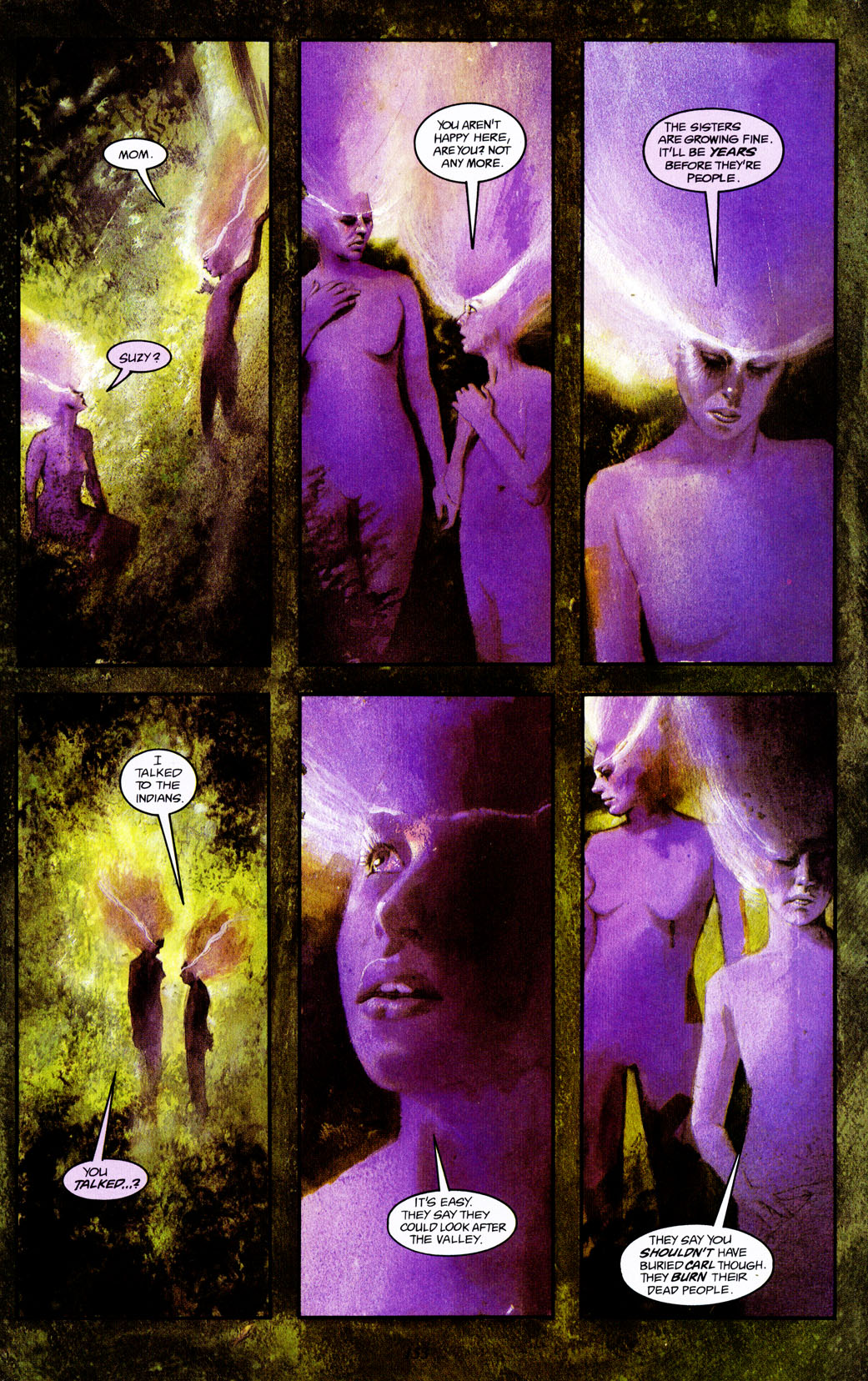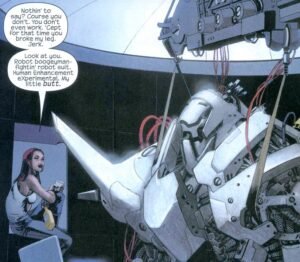Writer: Neil Gaiman
Artist: Dave McKean
DC Comics / Vertigo, 1989
I NOTICE WHEN I BRUSH my eyebrows I shed spores in the sunlight, specks of genetic ribbons flying away, each one I might like to believe remembering me and all before me back to the big bang when everything in all the cosmos was indeed a mere speck hurtling through a vast expanding space, needing only a jolt and a fertile bed to seed and live again. This is a little how it felt submerged in the three-issue BLACK ORCHID origin story from 1989, witnessed by writer Neil Gaiman and illustrator/designer Dave McKean. The art here yearns for the largest possible screen, preferably on ceiling-high boards that take two people to turn the pages and gape at the painted scenery, deeply green and pink and purple for good, gray for bad, red for violence, all melted into a colorless flavor almost tasted instead of viewed like a new sense observing the world with recalibrated intelligence inventing life as a plant.

Awakening as an alien, I feel forward warily, along with the immortal newborn heroine and her young charge. Small episodes with Batman and Swamp Thing that emerge in the submerged scenery make apt companions for this strange woman creature bound to earth like a plant and free to roam the skies like a spore, nearly unkillable, in the way plants readily die and revive.

“Will you become a crimefighter?” Batman asks at one point, recognizing she is the same Black Orchid, yet also new. The way he and Swamp Thing decide to help her, each in his own way, shows the value of trust and reputation over time, social cues as important as genetic fitness to help keep you alive. Who was before you and how they behaved matters. Many frontiers in the world today hold enduring legacies of hatred. Consider your own moral breeches when the bat shadow looms nearby. Does the gravelly voice say, “Whassup?” or something more sinister.
Plainly in the wilds of America we have done a poor job training new crimefighters. Warped and woofed in English culture through the scorched-earth genocide practiced in Ireland that left a landscape scraped bare with not a thing left alive, so our armed crimefighters swept the continent clean all the way to Oregon, even with Sherman’s cannons marching here this long way through the wilderness. Maybe you saw, too, on the tv from an old photograph a pile of bison skulls a mountainside high featuring proud hunters with rifles mere specks midst the carnage.
“Tell your young men to stop shooting us,” an Indian leader once pleaded in one of those treaty tents along the road west.
Later, ironically, our crimefighting in Korea was called a police action, not a war, and so it was. We uphold the virtue of our veterans, many related to us, yet remain blind to our moral breaches failing to protect freedom and security. William Blum recorded news from South Korea in the late 1940s: “Mark Garth, a correspondent for the Chicago Sun, wrote that American soldiers ‘fired on crowds, conducted mass arrests, combed the hills for suspects, and organized posses of Korean rightists, constabulary and police for mass raids.’”
Those who supported a unified Korean state in cooperation with communists, run by the public for the public, were hunted down and rooted out. Village collaborators were sometimes summarily executed. Similar scraping of the landscape was occurring in Greece, first by British troops with the same rabid anti-communist fervor, preparing future strife for decades to come, rippling through the present.
Today the story is much the same and worse. Master-of-evil types like Lex Luthor—who appears here as the dark force—dominate capital posts in industry, finance, and property around the world, though we as yet have no good name for them. Saying anti-communist, neoliberal, oligarch, autocrat, one-percent or nazi describes little about them. Saying pirate seems too vulgar. They need a word more ancient and expressive of the moral breach betraying our trust, and our blood sacrifice.

Such illuminations might help Black Orchid determine what kind of crimefighter she wants to become, and how much force it will take. One danger in her story is the fantasy notion that so much of herself is reborn through her genes. For many millennia this is exactly what people believed, justifying divisions between races and classes and families of people that turn out to be imaginary. I remember how hard it was to convince myself that “RNA does not modify DNA”—in other words, experience can overlay and modify gene function as our immune system does, but that modification is not learned and passed to subsequent generations. You do not grow into yourself fully born like a plant from a seed. Most spiritual nourishment that makes you who you are lies in the monsoon outside dripping and blowing from every surface, and carrying the colors of everything touched along the way.
Afterward I imagined the word brought me into the world, yet now I remember there was only a voice like a tendril in the wind creeping toward me, not quite singing, more a windswept emotion whispering to me to hear and stir. I feel I was here before a century ago and a century before that spiraling forward, drawn as if by gravity, plotting a rhythm in the background I sometimes remember for the feeling, though not the sense.


